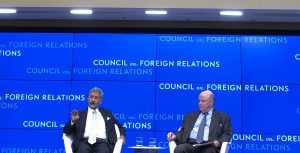
“Terror by night, and cricket by day” – it can’t be business as usual with Pakistan. This was the big ticket message that emanated from India’s External Affairs Minister S. Jaishankar’s interaction with the strategic community at the Council on Foreign Relations, an influential New York-based think tank.
With eminent strategic experts listening in, Dr Jaishankar outlined a big-picture view of India’s foreign policy, including New Delhi’s relationship with major global powers, including the US and China. However, his most caustic remarks were reserved for Pakistan, a nuclear-armed failing country, which uses terrorism as “a large-scale industry against its neighbor.”
In a damning indictment of Pakistan, Mr Jaishankar made it clear that India can’t have talks with a neighbour that “is conducting terrorism and follows a policy of implausible deniability.”
The “issue is not whether to talk or not, everybody wants to talk to their neighbor. The issue is how do I talk to a country that is conducting terrorism and follows a policy of implausible deniability,” said Mr Jaishnakar in a discussion moderated by Frank Wisner, a veteran American diplomat and US’ former ambassador to India.
Responding to a question on whether cricket can build bridges between India and Pakistan, Dr Jaishankar said: “If the dominant narrative of a relationship is of terrorism, suicide bombings, violence, then you say, OK, guys, now take a break, let’s go and play cricket, I think that’s a very hard narrative to sell to people,” said Mr Jaishankar. “Sentiments of people do matter. And the one message I don’t want to give is that you do terrorism by night, and it is business as usual by day. You know, and unfortunately that’s the message I would give if I were to follow this one.”
The big challenge before us, Dr Jaishankar said, is if you have differences with a neighbor, how do you resolve them?
“You have a neighbor who will not trade with you, who is a member of the WTO and, before that, of the GATT, but will not extend MFN status even though they are legally obliged to, and we did,” said Jaishankar.
“You have a neighbor who would not allow you connectivity, so we have, for example, the potential to use Pakistan to transit on to Afghanistan or Iran, but they will not allow you that connectivity; who in many ways have slowed down regionalism largely because of a concern that that might integrate them more with our economy; who filter people-to-people interaction. So it’s a very challenging neighbor, OK?”
Mr Jaishankar effectively ruled out any talks with Pakistan till the latter abandons terrorism as “a tool of statecraft, as a way of pressurizing you to come to the negotiating table.”
“You have terrorism in different parts of the world, but there is no part of the world where a country uses it consciously, deliberately as a large-scale industry against its neighbor,” he said.
Mr Jaishankar, a former foreign secretary of India, also robustly defended the Indian government’s decision to revoke Article 370 and reorganize Jammu and Kashmir on August 5, 2019.
“Pre-August 5, Kashmir was in a mess. The difficulties in Kashmir did not start on August 5. August 5 is supposed to be a way of dealing with those difficulties. So the choices were either you continue what was clearly not working or you try something very different. And I think the decision was to try something very different,” he said.
“So our expectation today is, by doing away with what was a temporary solution, what was meant as a bridge but became a barrier, that we will be able to push investments, economic activities, into Kashmir, that we will be able to frankly change the economic landscape, change the social landscape.”
(Manish Chand is Founder-CEO and Editor-in-Chief of India Writes Network and India and World, a pioneering magazine focused on international affairs. He is in New York to report on and analyse the 74th session of the UNGA and PM Modi’s visit to the US)
Author Profile

- Manish Chand is Founder and Editor-in-Chief of India Writes Network (www.indiawrites.org) and India and World, a pioneering magazine focused on international affairs. He is CEO, Centre for Global India Insights, an India-based think tank focused on global affairs.
Latest entries
 India and the WorldFebruary 27, 2026Modi visit: India-Israel partnership enters a new era
India and the WorldFebruary 27, 2026Modi visit: India-Israel partnership enters a new era India and the WorldFebruary 24, 2026Unravelling Modi’s Israel journey: What to expect
India and the WorldFebruary 24, 2026Unravelling Modi’s Israel journey: What to expect India and the WorldFebruary 17, 2026South-by-South: Focus on people-centric solutions at India AI summit
India and the WorldFebruary 17, 2026South-by-South: Focus on people-centric solutions at India AI summit India and the WorldFebruary 7, 2026Modi hails interim India-US trade deal, Goyal says no concessions made on agriculture
India and the WorldFebruary 7, 2026Modi hails interim India-US trade deal, Goyal says no concessions made on agriculture







